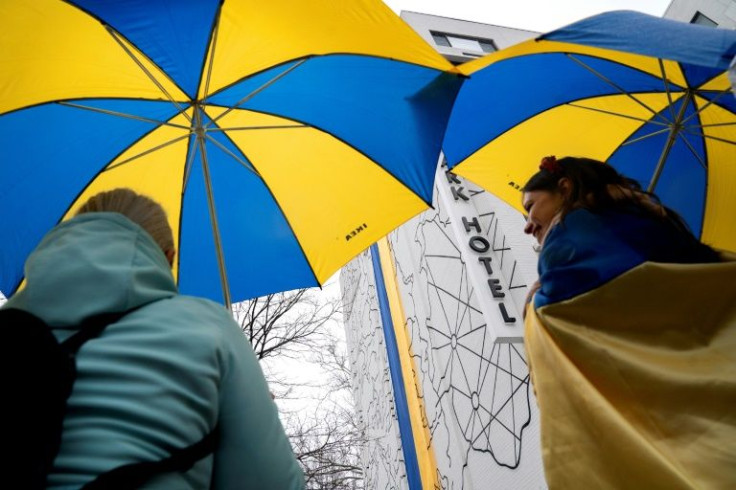Stocks Slip As Ukraine Peace Talks Stall, Economic Outlook Worsens
European and US stocks sank Thursday as peace talks between Russia and Ukraine stalled, sapping a spurt of optimism in the prior session, which was compounded by a rapidly worsening inflation and growth outlook.
Ukraine's Foreign Minister Dmytro Kuleba and Russian counterpart Sergei Lavrov met in Turkey in the first top-level talks since Moscow's invasion two weeks ago, but failed to make any progress to end a conflict that has sent more than 2.3 million people fleeing the country.
"The latest talks between Russia and Ukraine failed to provide breakthrough in ending the war," said ThinkMarkets analyst Fawad Razaqzada.
"Markets have reacted in the way you would expect."
European and US stocks fell after having surged the previous day on sliding oil prices and a glimmer of hope for an end to the conflict that has seen Western nations slap a range of sanctions on Russia, to isolate its economy.
IMF Managing Director Kristalina Georgieva warned the Washington-based crisis lender would likely downgrade its forecast for global growth this year due to the conflict, adding to the downbeat sentiment.
Oil prices initially clawed back some ground after falling more than 12 percent on Wednesday amid hopes oil producing nations will step up production.
However, they retreated later in the day with European benchmark Brent North Sea oil down 1.7 percent and New York's WTI 2.6 percent lower.
Both remained below the peak of $139 reached earlier this week when investors were spooked about moves by Western nations to ban Russian oil.
Markets have been rocked by extreme volatility in the two weeks since Russia invaded its neighbor.
Trading of shares in Russia's steelmaking giant Evraz, whose key shareholders include Roman Abramovich, was suspended in London after the UK froze the assets of the Russian oligarch over his alleged Kremlin links.
It includes a halt to Abramovich's plan to sell football giant Chelsea.
The latest economic data provided little comfort to investors, however.
US consumer prices rose at a fresh 40-year high, spiking 7.9 percent annually in February amid rising costs for gasoline, food and housing.
"Everything that makes up inflation is going bonkers," Adam Sarhan of 50 Park Investment told AFP, adding: "it really slows down growth and that becomes stagflation."
US Treasury Secretary Janet Yellen acknowledged that rising prices are a problem and annual inflation likely will "remain very uncomfortably high."
The European Central Bank on Thursday jacked its inflation forecast for this year up to 5.1 percent, while cutting the outlook for growth to 3.7 percent.

While it will remove pandemic aid to the economy quicker than it had previously indicated, the ECB also gave itself more flexibility as to when it will start raising interest rates.
"The Russia-Ukraine war adds further fuel to the blazing rate of inflation via higher energy, food and core commodity prices that are turbo charged by a worsening in supply chain problems," Kathy Bostjancic of Oxford Economics said.
The euro slid against both the dollar and pound.
New York - Dow: DOWN 0.3 percent at 33,174.07 (close)
New York - S&P 500: DOWN 0.4 percent at 4,259.52 (close)
New York - Nasdaq: DOWN 1.0 percent at 13,129.96 (close)
EURO STOXX 50: DOWN 3.0 percent at 3,651.39 (close)
London - FTSE 100: DOWN 1.3 percent at 7,099.09 (close)
Frankfurt - DAX: DOWN 2.9 percent at 13,442.10 (close)
Paris - CAC 40: DOWN 2.8 percent at 6,207.20 (close)
Tokyo - Nikkei 225: UP 3.9 percent at 25,690.40 (close)
Hong Kong - Hang Seng Index: UP 1.3 percent at 20,890.26 (close)
Shanghai - Composite: UP 1.2 percent at 3,296.09 (close)
Brent North Sea crude: DOWN 1.7 percent at $109.21 per barrel
West Texas Intermediate: DOWN 2.6 percent at $105.90
Euro/dollar: DOWN at $1.0986 from $1.1076 Wednesday
Pound/dollar: DOWN at $1.3081 from $1.3181
© Copyright AFP 2024. All rights reserved.





















